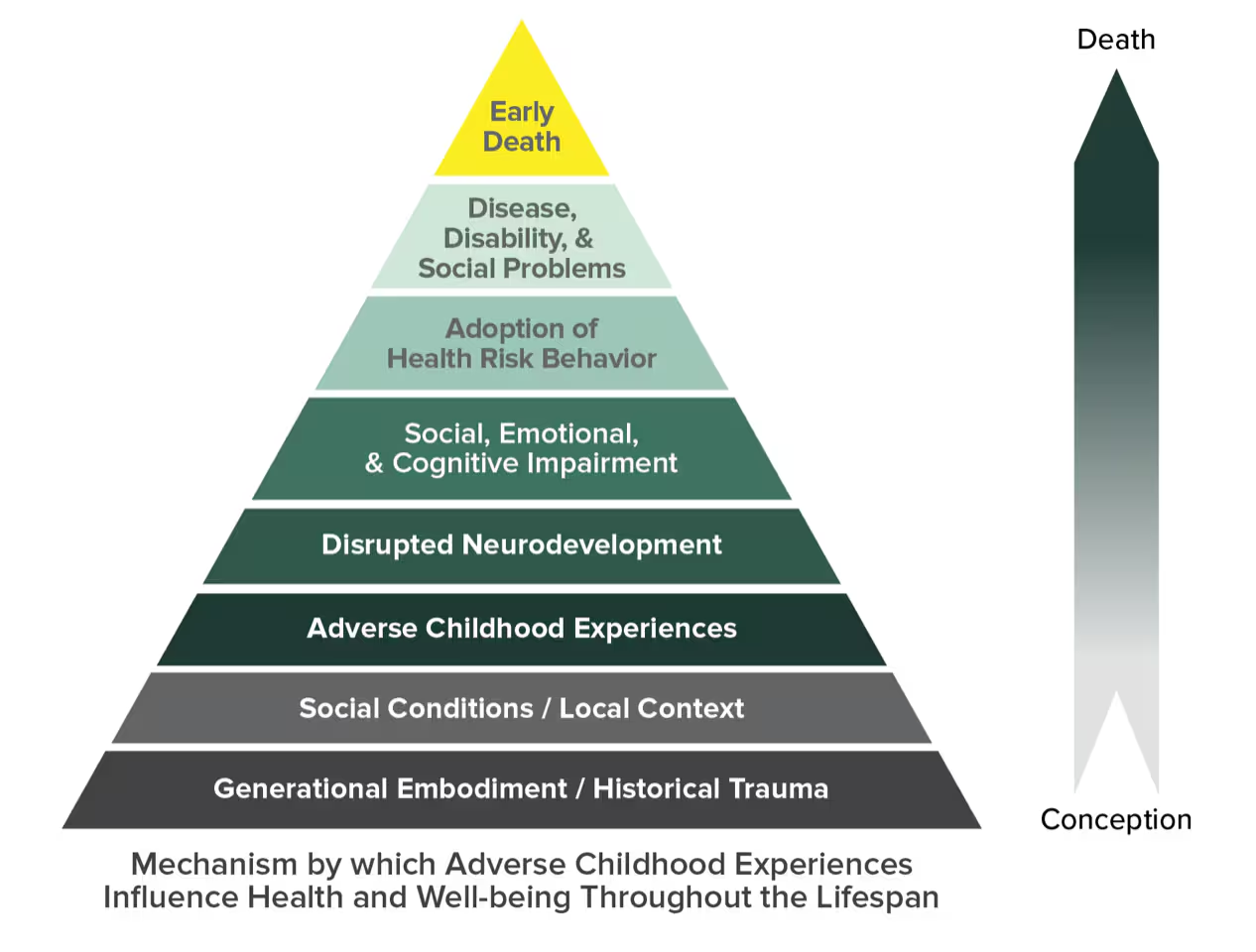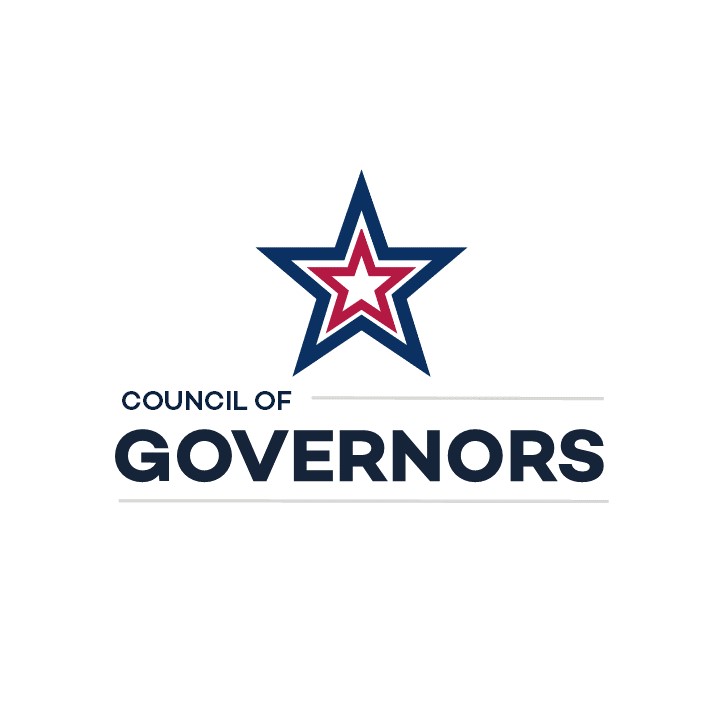States discovered a variety of policy and programmatic approaches to improve the MOUD landscape. States were able to pilot interagency collaborations, launch training and education curricula and explore innovative solutions around screening, treatments and case management.
(Download)
Executive Summary
In July 2021, the National Governors Association (NGA), American Correctional Association (ACA), and Justice System Partners (JSP) launched a state workshop and technical assistance opportunity on Improving Outcomes for Individuals with Opioid Use Disorder on Community Supervision (Community Supervision Workshop). The purpose of the Community Supervision Workshop was to provide Governors’ policy advisors, senior correctional administrators, community supervision agency heads, state behavioral health and Medicaid leaders, and senior state public health and public safety officials with best practices and training. The workshop aimed to provide technical assistance related to increasing connections to, and continuity of, treatment services for justice-involved individuals, including medication for opioid use disorder (MOUD), to improve health and safety outcomes in the community.
The Community Supervision Workshop was funded through a cooperative agreement grant from the Centers for Disease Control and Prevention (CDC) and engaged the American Correctional Association (ACA) and Justice System Partners (JSP) as subcontracted partners to offer states specific subject matter expertise that would complement NGA expertise. Through the workshop, state teams learned best and promising practices from national experts, practitioners and peers from around the country. The peer-to-peer learning aspect of the workshop is a feature of NGA learning opportunities that bring together states interested in learning best practices so they can hear examples from other states addressing similar issues.
From July 2021 through January 2022, Governor-appointed teams from four states—Alaska, Maryland, Tennessee and Virginia—were competitively selected through a request for application (RFA) process to engage in strategic planning to strengthen health and substance use treatment services for justice-involved populations on community supervision. Governors’ support of the Community Supervision Workshop, and the action plans that state teams developed, were critical to the successes of each state. Their endorsements created clear goals for the work, fostered collaboration and ensured fidelity to evidence-based practices.
Introduction
According to the CDC, national drug overdose rates increased 29% between September 2019 and September 2020. Over 100,306 drug overdose deaths occurred in the United States in the 12 months ending in April 2021 — the highest number of overdose deaths ever recorded in a 12-month period, suggesting a possible acceleration of overdose deaths during the COVID-19 pandemic. Data from 2012 indicates that 40% of male individuals on probation and 38% of male individuals on parole had an alcohol or other substance use disorder. While these data are not comprehensive, they indicate the significant unmet treatment and behavioral health needs of individuals on community supervision.
Governors and senior state officials have led the nation’s response to addiction challenges and the opioid epidemic over the last decade. This response has included recognizing that the risk of overdose for individuals returning to the community from incarceration is significantly higher than the general population and that drug overdose remains a leading cause of death following release from jail or prison. While states have made progress in implementing and expanding access to treatment services for justice-involved individuals within correctional facilities, many states continue to encounter significant barriers to continuity of care and access to evidence-based treatment upon reentry and reintegration into the community. In 2018, 1 in 58 adults were under some form of community supervision, probation or parole. With many individuals released from incarceration onto probation and parole as well as sentenced directly to supervision, addressing the OUD treatment needs and the risk of overdose within this population is a key priority for Governors and state officials.
Increasing access to treatment for incarcerated individuals has improved the health and safety outcomes for those in correctional facilities, and states are now seeking to ensure continued success upon reentry and for justice-involved individuals in the community. Data also shows that Black adults are about 3.5 times as likely as white adults to be on probation or parole, which requires addressing the barriers to access to treatment for individuals on community supervision through a lens of racial equity.
Individuals on community supervision with opioid use disorder encounter unique challenges related to accessing treatment services, navigating supervision conditions, and meeting other needs such as employment and housing. Moreover, state supervision systems are complex and can face many unique challenges in instituting statewide, scalable reform, particularly around increasing treatment access to those on supervision. Given the various ways that individuals are placed under supervision, states face numerous hurdles to strengthening supervision policies – from coordinating with local jurisdictions and collaborating with judicial branch officials, to the scarcity of treatment and supervision modalities. Addressing the behavioral health and treatment needs of this population requires increased coordination between community corrections, judicial stakeholders, community treatment providers, state Medicaid agencies and others.
Governors’ offices and multiple state agencies play important roles in ensuring access to MOUD for justice-involved populations in the community, including providing funding and resources for community-based health care services and strengthening behavioral health and recovery supports. In addition, states can implement and expand community supervision practices that align with effective behavioral health strategies and support access to MOUD for individuals on probation and parole. Many state officials (but not all) can work to change the model of supervision from a deterrent or accountability-only model to one that recognizes that individual behavior change happens over time and is often not linear.
Methodology
States applying for the Community Supervision Workshop were required to outline several goals they would seek to achieve through the project. These goals focused on issues such as:
- strengthening coordination and partnership between community corrections and community-based treatment;
- reviewing and amending conditions of supervision laws or policies to improve opioid use disorder (OUD) treatment access and support;
- mapping community-based treatment services and increasing capacity of service providers;
- expanding peer support services for individuals affected by OUD;
- implementing in-reach programs in state correctional facilities, leveraging Medicaid and strengthening linkages to community treatment providers;
- addressing supervision violations related to OUD treatment needs and reducing revocations; and
- developing initiatives to increase coordination with judiciary stakeholders and local jurisdictions as well as provide training, support, and assistance to them.
After states were accepted through the application process and set their initial goals, a virtual workshop meeting kicked off the project and was followed by an intensive technical assistance period.
Virtual Workshop
On July 27-28, 2021, the NGA Center for Best Practices, ACA, and JSP convened all four state teams for a virtual workshop. Each day of the workshop offered panel sessions from experts in the field, researchers, state Medicaid directors and more. On the workshop’s first day, state teams were given the opportunity to highlight current efforts and goals for improving outcomes. This offered a level-setting discussion that explored barriers and challenges states face when aligning treatment and corrections strategies. Participants attended sessions focused on aligning strategies for health outcomes and improving access to community-based treatment for justice-involved populations affected by OUD.
The workshop’s second day featured panel presentations on implementing community supervision policies to support connections to OUD treatment, as well as the role of Medicaid in supporting access to treatment. Lastly, before concluding the virtual workshop, states were also given time to work together as a team so they could begin the action planning process.
Technical Assistance
States worked with NGA, ACA, and JSP staff to develop sets of specific, actionable goals that could be accomplished over the course of the project. This process included research, information and data gathering, coordination of resources, as well as cross-agency collaboration. After the planning phase, states implemented their agreed upon strategic action plans. The implementation phase spanned from September 2021 to January 2022. Throughout this time, NGA, ACA and JSP offered ongoing technical assistance to support progress in the form of monthly check-in calls, webinars and information sharing.
Throughout the technical assistance period, states expressed interest in learning best practices around training and educating probation and parole officers on addiction and medication for opioid use disorder (MOUD). To address states’ needs, the National Governors Association (NGA) and the American Correctional Association (ACA) held a webinar featuring Justice Systems Partners (JSP) to share best practices. The webinar offered states an opportunity to learn ways they can support probation and parole officers involved with implementing addiction treatment services in correctional facilities. A key focus of the webinar included understanding the conditions of community supervision for probation and parole officers and strategies to help navigate these conditions. States also had the opportunity to ask questions and learn from other states’ strategies to implement this work.
The following section focuses on identifying common challenges states often face in improving outcomes for individuals on community supervision affected by OUD. Next, the paper identifies key outcomes from the Community Supervision Workshop. Lastly, the paper concludes by highlighting lessons learned from the project.
State-Identified Challenges
Over the course of the Community Supervision Workshop, states identified several challenges to building capacity and increasing access to treatment among justice-involved populations. All four states experienced unique challenges brought on by the COVID-19 pandemic, particularly in being able to adapt treatment services to a rapidly evolving and uncertain landscape. Aside from the pandemic, states faced existing and new challenges related to the coordination of treatment services and delivery. These challenges included:
- access to and availability of treatment services;
- funding and resources;
- training and education; and
- stigma.
Access to and Availability of Treatment Services
For many states, the insufficiency of available treatment services for individuals affected by OUD who are also under community supervision poses a significant barrier. Moreover, even when these services do exist, populations that reside in rural areas find them difficult to access and must make do with limited options for treatment, including choice of medications to treat OUD. A shortage of community-based providers who treat OUD in underserved areas also adds to this disparity. Reducing the barriers to accessing consistent, quality treatment is paramount for individuals on community supervision as individuals involved in the legal system are more likely to be affected by addiction and are at high risk for overdose. The availability of treatment services that include MOUD is a critical element for recovery as it is often considered the first line of treatment for those with OUD. States recognized that increasing access to treatment services would require breaking down siloes across agencies, creating a system of collaboration and investing in community-based solutions.
Funding and Resources
Another common challenge for states is the need for increased funding and resources for individuals on community supervision affected by OUD. One state, for example, faced significant barriers to enrolling populations on community supervision in Medicaid. This is important because Medicaid coverage offers critical access to physical and behavioral health care, including treatment for those affected by OUD. States investigated processes for Medicaid enrollment to connect individuals to treatment services that best meet their needs. This process can be complex and requires coordination from a diverse group of stakeholders such as probation and parole staff, community providers, peers and family members, as well as managed care organizations (MCOs). States also recognized the importance of maximizing current resources for this population such as through the use of therapeutic courts that provide intensive case management services, and they looked to case examples from states where use of these services is common practice.
Training and Education
There were three core training and education needs identified during the project. First, several states in the workshop identified effective training and education around OUD and other substance use disorders (SUD) as a significant gap in MOUD accessibility for individuals on community supervision. Second, some identified a need to coordinate education of probation and parole staff, prosecutors, defense attorneys and judges about the physiology of opioid addiction—specifically to help them understand OUD as a chronic condition that requires treatment like other chronic conditions, as well as the efficacy of treatments such as MOUD. One state also identified that standardized training is needed so probation and parole staff share a common understanding of these issue. This education is crucial so these staff can identify those that may be affected by OUD, complete adequate referrals for affected individuals, ensure the continuity of their care beyond completion of community supervision, and connect individuals with resources for accessing and covering post-supervisory care. Third, there was a significant need to address stigma surrounding OUD and MOUD. Training and education can also break down common misconceptions and foster effective partnerships among stakeholders.
Stigma
Tied to the challenges of adequate training and education is the need to reduce the stigma that surrounds those who are affected by OUD. This stigma is further exacerbated for those involved in the legal system and on probation or parole. Misconceptions about OUD can prevent individuals from receiving treatment. States acknowledged that stigma poses barriers to proper screening, assessment, diagnosis, treatment, and recovery and influences risks for overdose and death by suicide. In addition to the general stigma around OUD, however, there are also many misconceptions around medications for its treatment. Some stakeholders may have the perception that medications for opioid use disorder, such as methadone or buprenorphine, substitute one drug for another. Instead, MOUD medications are utilized to treat a chronic medical illness. States often face significant challenges in reshaping this narrative with stakeholders that have contact with individuals affected by OUD under community supervision.
Key Outcomes
As states implemented their plans to improve outcomes for individuals with opioid use disorder on community supervision, several key outcomes emerged among states. These outcomes included:
- improved training and education;
- increasing cross-system collaboration and building of partnerships;
- implementing innovative strategies for better health outcomes; and
- connecting with peer states to learn best practices.
Training and Education
Throughout the workshop and technical assistance period, several states set a goal to identify gaps in training resources and materials for probation and parole staff. In November 2021, NGA and JSP conducted a webinar on Training and Educating Probation and Parole Officers on Addiction and MOUD. All states joined the webinar to learn more about the importance of building a coalition from within agencies to reduce stigma and garner buy-in, learn about the current landscape (scale of the problem, capacity of providers to treat, and current practices to connect and support justice-involved individuals with OUD) and understand the efficacy of MOUD. The webinar also highlighted probation and parole officer education as an ongoing need rather than an isolated event. State teams relayed that the webinar was informative, with some states indicating the items presented were precisely what the team had been seeking on the topic.
A priority for the Virginia team was to develop and provide education specifically for all state and local community corrections staff. To that end, the team arranged for 15 scholarships—provided through the Department of Behavioral Health and Developmental Services (DBHDS) — for Virginia Department of Corrections (VADOC) staff to attend the annual Virginia Association of Medication Assisted Recovery Providers (VAMARP) conference. The conference offered staff a more comprehensive understanding of MOUD and best practices to serve individuals under community supervision. Additionally, VADOC staff will now be formally educated on an ongoing basis regarding Medicaid addiction recovery and treatment services benefits. In January 2022, the Virginia Department of Medical Assistance Services (DMAS) also hosted a webinar on ways to help those returning to the community post-incarceration enroll in Medicaid and access behavioral health services. The webinar specifically focused on Medicaid-covered substance use disorder treatments, specifically the Addiction and Recovery Treatment Services (ARTS) benefit, which expands access to community-based addiction and recovery treatment services, inpatient detoxification and residential SUD treatment. Lastly, beginning in 2022, all state probation and parole staff have access to a virtual, for-credit training that provides education on substance use disorders and MOUD. Outside of the workshop, VADOC plans to shift staff education to ongoing discussions about SUD and OUD, rather than annual training, by holding annual conferences, refreshers at quarterly unit head meetings, and visits to monthly staff meetings.
Like Virginia, the Maryland state team also identified training – specifically geared toward stigma reduction – as a high priority for the Maryland Division of Parole and Probation (DPP) staff. Before the workshop, the state identified a need to develop a standard training curriculum for DPP staff that serve individuals affected by OUD so they could coordinate a statewide vision for screening and referral to treatment services and change perceptions on OUD. Throughout the workshop, however, the team began working with the Maryland Police and Corrections Training Commission (MPCTC) to develop a robust curriculum for corrections officers, parole officers and custodial staff. DPP also continues to train state community supervision staff on recognizing and responding to opioid overdose and the proper use and administration of naloxone—a vital effort when considering the acute risk for overdose for individuals post-release. The staff, in turn, continue to engage and educate clients to reduce opioid fatalities for those under community supervision.
Breaking Down Silos and Building Partnerships
Another overarching goal for states in the workshop was to build and strengthen partnerships and collaboration across health, public safety, and probation and parole agencies and sometimes with non-state entities including providers and community supports. States acknowledged that bolstering these collaborations could improve efficiency, maximize resources and reduce the duplication of efforts.
Alaska identified the need to increase collaboration among state agencies, providers, treatment and recovery experts and the therapeutic court system. The state team recognized that the unique and complex geographical, access and coordination challenges required conversations among diverse groups of stakeholders that may require innovative partnerships among them in the future. To that end, NGA and the state team organized the Alaska Community Supervision Stakeholder Convening to Support Justice-Involved Individuals with Opioid Use Disorder, which took place in January 2022, at the end of the intensive technical assistance period that became a capstone for their efforts in several ways.The virtual gathering brought together over 30 participants from across Alaska including addiction medicine physicians, probation and parole board members, epidemiologists, clinical coordinators, state agencies, and community treatment and recovery experts. The convening featured two sessions with experts from SAMHSA, treatment and recovery providers and advisors, and state MOUD coordination. Participants engaged in robust discussion that highlighted existing challenges around the continuity of treatment, accessibility of treatments especially in geographically remote areas, as well as the need for securing other basic needs for these individuals such as housing and employment. Despite the challenges that were raised, participants also identified several key areas where opportunities exist. These opportunities included leveraging non-profit assistance programs that can help smooth Medicaid coverage gaps, clinical champions that can advocate for system-wide improvements, and leaders from other states who have overcome similar challenges.
One of the most meaningful outcomes of the convening was the connection between Alaska and Vermont on best practices for how to create and implement a sustained MOUD program in a unified corrections system. This connection was made possible by ACA who linked NGA staff with leading corrections experts in Vermont to learn about how they could work with Alaska to provide best practices and lessons learned from their work. This session was conducted as a peer-to-peer learning model and was moderated by ACA. The creation and implementation of Vermont’s MOUD program was discussed step by step with the experts who designed it. The inter-organizational work offered Alaska many insights, especially given the similarities in Vermont’s unified correctional system organization. Vermont, like Alaska, is a largely rural state, and though Alaska is much larger than Vermont, both states share smaller population sizes, and many lessons were applicable to Alaska.
Virginia also prioritized increasing collaboration and partnerships within the state. The team’s main goal centered on developing a pilot project that would strengthen coordination and partnership between the Virginia Department of Corrections (VADOC) Probation and Parole Districts and local Community Services Boards (CSBs). At two pilot sites, the state team convened discussions with VADOC, CSBs, Department of Behavioral Health and Developmental Supports (DBHDS), Department of Medical Assistance Services (DMAS), and managed care organization staff. Discussions at these meetings contributed to the development of a plan to move forward with future collaborations between CSBs and the VADOC Probation and Parole Office. VADOC staff also presented to the Virginia Association of Community Services Boards’ substance use disorder council to share plans for a DOC-CSB conference in 2022. The conference will host executive leadership from the CSBs and chiefs of probation and parole for team building, networking and presentations. These cross-agency collaborations will allow the state to align strategies and strengthen efforts.
Implementing Innovative Strategies for Better Health Outcomes
States that participated in the Community Supervision Workshop expressed a desire to work toward innovative strategies that would improve health outcomes for those affected by OUD on community supervision. OUD and other substance use disorders are chronic medical conditions like diabetes or hypertension that require ongoing access to care and treatment. The added potential for relapse also creates additional challenges for OUD treatment and recovery. Some existing models and services in participating states have been unsuccessful in delivering positive results for this population. States recognized the need for more creative approaches that would better meet the needs of these individuals.
Tennessee expressed interest indeveloping treatment-oriented specialized caseloads for those with high or moderate treatment needs that include co-occurring substance use disorders and mental health disorders. Specialized caseloads utilize parole officers that are trained to address drug addiction as a disease and accommodate individuals experiencing substance use disorder with more flexibility than individuals on standard community supervision. Oftentimes, individuals on a special caseload are prescribed medication assisted treatment that would otherwise result in a positive drug test.
To aid in this endeavor, NGA facilitated a peer-to-peer learning session with Pennsylvania, an innovator state with specialized caseloads. The conversation introduced Tennessee state team members to experts in Pennsylvania who implemented a similar program. The session provided an opportunity for Tennessee to ask questions and gain insights into how Pennsylvania tailored community supervision programs to address the needs of individuals affected by OUD and reduce recidivism among this population. Pennsylvania’s combined MOUD and corrections team gave a thorough overview of the state’s process for establishing specialized caseloads and gave important recommendations for Tennessee experts to consider as they develop their program. NGA facilitated resource sharing between Pennsylvania and Tennessee through previously developed training materials created for specialized parole officers to help inform Tennessee’s pilot program. Tennessee launched its specialized caseloads pilot in March 2022. The pilot program will last six months and conclude with a comprehensive evaluation process to provide feedback improvements for the future of the program.
Another area for innovative approaches in Maryland focused on the need for implementing universal assessment screenings to identify those affected by OUD on community supervision. The team found that most counties in the state already adopted universal assessment screenings available through their probation and parole offices. Inferior health outcomes are more likely without a standard tool that helps identify individuals affected by OUD and their specific treatment needs. The Maryland team met with each county Behavioral Health Authority to identify and designate local recovery specialists that could administer OUD screening assessments. The Division of Parole and Probation subsequently collaborated with the Maryland Department of Health and local health agencies in each county to provide clinical OUD assessments.
Given new technologies being developed through telehealth, Virginia increased access to peer recovery specialist (PRS) services. This was especially needed in areas with limited PRS coverage such as rural areas of the state. Throughout the workshop, the state team identified the areas where virtual PRS services would enhance recovery modalities when in-person services are unavailable. The Virginia Department of Corrections (VADOC) widely shared a video about PRS with other state agencies after being connected throughout the workshop, further building stakeholder relationships across the state. To complement the PRS initiatives, print posters were also provided to all probation and parole districts and Community Corrections Alternative Programs (CCAPs) as an education tool for staff. VADOC staff partnered with Department of Behavioral Health and Developmental Services (DBHDS) staff in the Office of Recovery Services to utilize an email marketing system that notifies potential PRS vendors of contract vendor vacancies across the commonwealth. This is an ongoing effort that is set to continue through 2022.
Conclusions
Through this workshop, states had the opportunity to assess barriers that prevent effective MOUD implementation. Bridging these gaps is especially challenging given the nature of OUD treatment and recovery, as well as the rules and requirements surrounding community supervision policies in some states. States, however, discovered a variety of policy and programmatic approaches to improve this landscape. States were able to pilot interagency collaborations, launch training and education curricula and explore innovative solutions around screening, treatments and case management. In some states, education of a broader set of stakeholders and stigma reduction among stakeholders on issues related to MOUD went a long way toward increasing opportunities to bridge these gaps. Furthermore, states were able to engage in meaningful conversations with key stakeholders to advance these efforts, learn from experts, engage with peer states to model innovative practices and share other best practices. While aware of the challenges that exist in some states, state experts remain eager to continue this work beyond the technical assistance period and hope to build upon their significant accomplishments.
Some of the states have already begun to advance the work conducted during the project since its conclusion. Alaska is investigating ways to enhance coverage of MOUD treatment for individuals under community supervision through Medicaid or other coverage sources that would create a smooth transition for the continuum of care needed as individuals move from incarceration to community supervision to post-supervision status. Maryland continues to identify opportunities for stigma reduction training and is developing an SUD training curriculum while planning for the collection and tracking of overdose incidents among individuals under community supervision and intake assessments and referrals for those affected by SUD. Maryland is continuing to work with most counties to provide assessments for substance abuse including OUD with a goal to engage every county in the state in these assessments. Maryland’s Division of Parole and Probation and the Board of the Maryland Association for the Treatment of Opioid Dependence (MATOD) met to facilitate increased collaboration with community Opioid Treatment Programs (OTPs).
Virginia is continuing its pilot programs to improve communication and referral strategies among stakeholders. The Virginia Department of Corrections will host a one-and-a-half-day conference in 2022 for executive leadership from all Community Services Boards/Behavioral Health Authorities across Virginia in partnership with the Probation and Parole District Chiefs. Partnering with Community Services Boards/Behavioral Health Authorities to strengthen relationships is imperative to build partnerships and increase access to co-occurring substance use disorder and mental health treatment. This enhanced collaboration will lead to safer communities and increased health and wellness for Virginians and move Virginia forward in addressing the growing concerns regarding co-occurring mental health and substance use disorders among individuals of mutual concern for the Department of Corrections and Virginia Community Services Boards/Behavioral Health Authorities. The state is also focused on maintaining intrastate and interagency partnerships and collaborations on virtual education, information sharing and peer recovery supports.
Tennessee continues to develop a Treatment Oriented Caseload pilot, which launched in 2022, as a result of its participation in the project, which was enhanced by the peer-to-peer advice and training modules they received from Pennsylvania. Two of the states that participated in the Community Supervision Workshop (Alaska and Tennessee) presented their successful outcomes from the project during a briefing with industry leaders and other stakeholders organized by NGA in March 2022 to further engage on MOUD issues with experts in the field from across the nation.
As states continue their efforts in the intersection of public health and public safety, so too is NGA through the launch of a new learning collaborative focused on pre-arrest diversion and deflection to better support justice-involved individuals with substance use disorders. The learning collaborative will be focused on building state and institutional capacity and will convene cross-agency leaders in the state including public safety and public health officials, Governors’ criminal justice and health advisors, state opioid leads and other state agency stakeholders. NGA will provide ongoing technical assistance to states from December 2022 through June 2023. This project will be informed by many of the lessons learned and best practices elevated through the Community Supervision Workshop project.
Acknowledgements
The National Governors Association Center for Best Practices (NGA Center) would like to acknowledge the Centers for Disease Control and Prevention (CDC) for its generous support in developing this issue brief under Cooperative Agreement Number NU38OT000301. NGA Center extends a special thank you to the program experts and staff at CDC who provided valuable review and feedback on this paper. The findings and conclusions in this paper are those of the authors and do not necessarily represent the official position of the Centers for Disease Control and Prevention.
This publication was developed by Program Directors Shelby Hockenberry and Kenneth Hardy at the NGA Center. The NGA Center would like to thank the state officials and other experts whose expertise contributed to this publication. The NGA Center would also like to thank project partners Dr. Elizabeth Gondles, Michael Miskell and Dr. Kathleen Maurer at the American Correctional Association and Dr. Brian Lovins, Zach Dal Pra and Lore Joplin at Justice Systems Partners for their contributions throughout the project. Lastly, we also thank the NGA staff who contributed expertise and review of this publication and the current and former NGA Center staff who worked on the Regional Workshops on Expanding Access to Medications for Opioid Use Disorder Treatment for Justice-Involved Populations project and contributed insights on project outcomes including Program Directors Shelby Hockenberry and Kenneth Hardy, former Program Director Jeff Locke, former Senior Policy Analyst Nicole Banister, former Senior Policy Analyst Nawshin Ahmed, former Policy Analyst Tony Cutillo, Policy Analyst Brigitte Jolliet, former Senior Policy Analyst Kalyn Hill and former Policy Analyst Lacy Adams.
Suggested Citation
Hockenberry, S., Ahmed, N., Cutillo, T., Jolliet, B., Banister, N., Hardy, K., Adams, L., Hill, K. (2022, June). The Effects of Regional Workshops on Expanding Access to Medications for Opioid Use Disorder Treatment for Justice-Involved Populations Under Community Supervision: Best Practices from Four States. National Governors Association.













